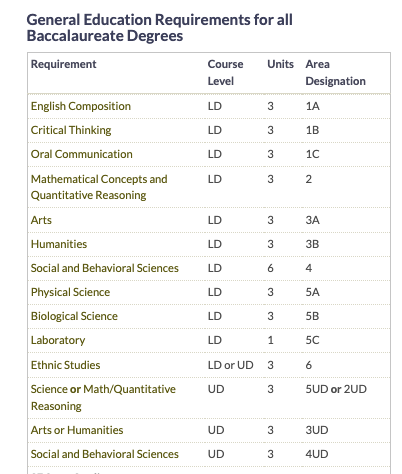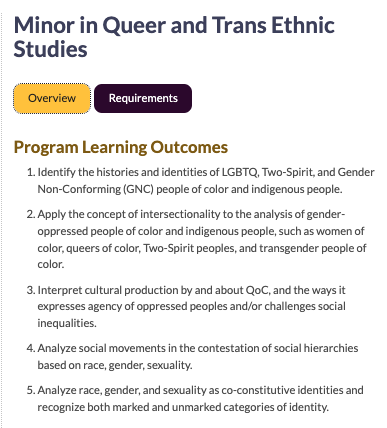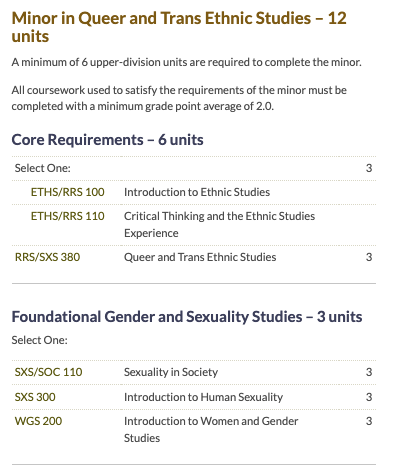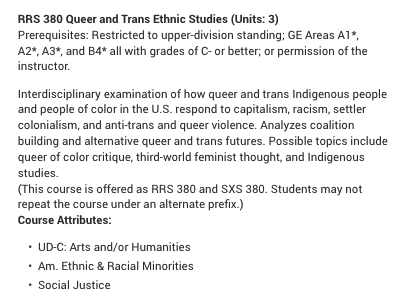LiberatED: San Francisco State University
Investigations
SUMMARY
San Francisco State University’s College of Ethnic Studies states that is “guided by these values in its journey towards liberation via self-determination and collectivism.” The college includes several departments such as African Studies, American Indian Studies, Asian American Studies, Latina/Latino Studies, and Race/Resistance Studies. It also offers a variety of majors and minors such as a minor in Queer and Trans Ethnic Studies.
All undergraduate university students are required to take three units of ethnic studies to fulfill General Education requirements.

The college’s ethnic studies courses feature content such as tenets of critical race theory, intersectionality, queer theory, oppression, postcolonialism, and white supremacy. Course readings include works from Angela Davis, Michel Foucault, Karl Marx, Frantz Fanon, Mao Tse-tung, and Che Guevara.
MAJORS AND MINORS
Below is an example of a College of Ethnic Studies minor available to undergraduate students:
Minor in Queer and Trans Ethnic Studies
The College of Ethnic Studies offers a Minor in Queer and Trans Ethnic Studies which includes learning outcomes such as applying the “concept of intersectionality to the analysis of gender-oppressed people of color and indigenous people, such as women of color, queers of color, Two-Spirit peoples, and transgender people of color” and interpreting “cultural production by and about QoC, and the ways it expresses agency of oppressed peoples and/or challenges social inequalities.

The minor requires twelve units for completion including the required course “RRS/SXS 380 – Queer and Trans Ethnic Studies.”

COURSES
ETHS 100: Introduction to Ethnic Studies
The course ETHS 100: Introduction to Ethnic Studies includes focusing on “structures of power and traditions of resistance.”

THS 115: Introduction to Craft, Activism, and Resistance in Communities of Color
The course ETHS 115: Introduction to Craft, Activism, and Resistance in Communities of Color states that it is an “introduction to craftwork by communities of color that engages with the politics of representation.”

ETHS 116: Algebra and Statistics for Social Justice
The course ETHS 116: Algebra and Statistics for Social Justice focuses on “topics such as education equity, income inequality, racism, and white supremacy and gender inequality to examine data using statistics.”

ETHS 117: Statistics for Social Justice
The course ETHS 117: Statistics for Social Justice focuses on “topics such as education equity, income inequality, racism, and white supremacy and gender inequality to examine data using statistics.”

ETHS 221: Health and Social Justice – Burning Issues, Taking Action
The course ETHS 221: Health and Social Justice – Burning Issues, Taking Action focuses on “Social and economic injustices as root causes of the uneven distribution of disease.”

RRS 380 – Queer and Trans Ethnic Studies
The course RRS 380 – Queer and Trans Ethnic Studies states that it is an “examination of how queer and trans Indigenous people and people of color in the U.S. respond to capitalism, racism, settler colonialism, and anti-trans and queer violence” and “analyzes coalition building and alternative queer and trans futures.”

ETHS 710: Theories and Issues in Ethnic Studies
The course ETHS 710: Theories and Issues in Ethnic Studies includes topics such as tenets of critical race theory, intersectionality, queer theory, oppression, and postcolonialism. Course readings include works from Angela Davis, Michel Foucault, Karl Marx, Frantz Fanon, Mao Tse-tung, and Che Guevara.
The course description states that it “identifies and critically examines these theories and issues since the field’s inception to its most current developments” and students will “review and analyze the evolution of concepts and trends around issues of race, class, gender, and sexuality central to indigenous people and people of color in the United States.”


Stay Informed
